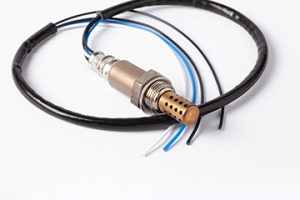Oxygen Sensors: What They Are and Why They Matter at Meineke in Yorktown
When your car struggles with fuel efficiency or emissions, a failing oxygen sensor could be to blame. Because this small part monitors your exhaust system, it helps your engine run clean and efficient. Whether you’re commuting around Yorktown or taking longer trips for the ball games, a working oxygen sensor is key to vehicle performance.
At Meineke in Yorktown, our ASE-certified technicians inspect and replace faulty oxygen sensors to restore proper engine function. So, in this post, you’ll learn what an oxygen sensor is, how it works, why it’s important, how to maintain it, and when to see a mechanic.
What an Oxygen Sensor Is and How It Works
Simply put, an oxygen sensor is a small electronic device in your exhaust system that measures the amount of oxygen in the exhaust gases. Since your engine needs a precise air-fuel mixture, the sensor helps adjust fuel delivery in real time.
When the sensor detects high or low oxygen levels, it sends a signal to your car’s engine control unit (ECU). As a result, the ECU adjusts the fuel injection to optimize performance. Because the oxygen sensor communicates constantly with your engine, it plays a big role in fuel economy and emissions.
So, Why the Oxygen Sensor Is Important
Even though it’s small, the oxygen sensor has a major job. Since it keeps the air-fuel ratio balanced, your engine relies on it for efficiency and control.
-
First, it improves fuel economy by adjusting how much fuel your engine burns.
-
Next, it helps reduce harmful emissions, thus making your car more eco-friendly.
-
Also, it prevents engine damage caused by running too lean or too rich.
-
In addition, it keeps your engine running smoothly and responsively.
-
Finally, it supports faster acceleration and better overall performance.
So, How to Maintain Your Oxygen Sensor
Although the sensor itself doesn’t need frequent maintenance, proper care of your engine system helps it last longer. So, follow these simple habits to extend its life.
-
Use high-quality fuel to reduce buildup in the exhaust system.
-
Fix oil or coolant leaks quickly to prevent sensor contamination.
-
Replace air filters on schedule to keep airflow clean.
-
Avoid letting the check engine light stay on without a diagnostic check.
-
Have the sensor inspected around 60,000 to 100,000 miles, depending on your vehicle.
When to See a Mechanic at Meineke in Yorktown
Sometimes, oxygen sensor problems start small but grow quickly. So, visit Meineke in Yorktown if:
-
Your check engine light is on
-
You notice a drop in fuel mileage
-
Your engine idles rough or stalls
-
You see black smoke or smell fuel from the exhaust
-
Your car fails an emissions test or inspection

So, Call Meineke in Yorktown Today for Expert Oxygen Sensor Service
Since the oxygen sensor helps your engine run clean, quiet, and efficient, don’t ignore the warning signs. At Meineke in Yorktown, our ASE-certified team checks and replaces oxygen sensors to help your vehicle run its best. Whether you’re chasing better mileage or fixing a check engine light, we’ve got you covered.
If the Meineke in Yorktown is not convenient, also check out these other locally-owned Meineke locations in Virginia:
- Meineke Virginia Beach #197
6399 Indian River Road
Virginia Beach, VA 23464-3500
Call (844) 768-6004 - Meineke Virginia Beach #312
1837 Laskin Road
Virginia Beach, VA 23454-4504
Call (833) 696-8494 - Meineke Virginia Beach #2739
1321 Diamond Springs Rd
Virginia Beach, VA 23455
Call (757) 687-0566 - Meineke Virginia Beach #2883
3700 Holland Rd
Virginia Beach, VA 23452
Call (757) 932-2952 - Meineke Charlottesville #342
1906 Emmet Street
Charlottesville, VA 22901-2815
Call (855) 747-2083 - Meineke Hampton #584
79 West Mercury Boulevard
Hampton, VA 23669-2508
Call (757) 690-7689 - Meineke Yorktown #851
4609 George Washington Memorial Highway
Yorktown, VA 23692-2766
Call (757) 847-9155 - Meineke Williamsburg #938
399 Second Street
Williamsburg, VA 23185
Call (757) 585-4492 - Meineke Denbigh #1088
415 Oriana Road
Newport News, VA 23608
Call (757) 814-2724 - Meineke Richmond #2514
5271 S Laburnum Avenue
Richmond, VA 23231
Call (804) 222-2862
